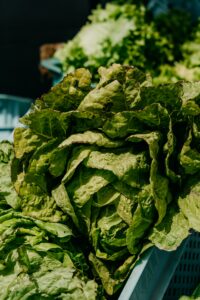By Sharon Oliver, Contributing Writer

REGION – Vegetables come in all sorts of forms, sizes and colors and are packed with vital nutrients. Red beets, yellow squash and orange carrots have their place, but it is the dark green leafy vegetables that are considered to be one of the most nutritious foods needed in our diet. Chock full of minerals and vitamins, this superfood group is so important that even your body may show signs suggesting there is an inadequate amount of leafy green consumption.
Symptoms of inadequate consumption
One such sign could be constipation, which is difficulty passing stools or infrequent bowel movements. Low in calories, rich in dietary fiber and loaded with vitamins, folate and iron, leafy greens promote better digestion. “Gut health is this sort of all encompassing, kind of determinate of overall wellness,” said Jen Belanger, a registered dietician in Belchertown. “It’s linked to so many chronic diseases like obesity, diabetes and even mental health issues like depression, anxiety and even schizophrenia and Parkinson’s.” When asked what foods are important for gut health during an interview for Mass Appeal, Belanger replied, “Fiber is huge.” She added, “Something like IBS or constipation could be signs that your gut health may not be where it should be.”
Symptoms like fatigue, slow wound healing and weakened immune function could be a sign of vitamin deficiency, another possible indication of low leafy green intake. Dark leafy greens are a major source of iron and magnesium, which are crucial for maintaining energy. Since these greens contain antioxidants and phytochemicals, skin issues like dry, dull complexions could possibly be the result of a low consumption of dark leafy greens.
A wide variety to choose from
Here is a short list of some healthy greens to consider adding to your daily meal plan.
Beet greens
Beet greens are great for the immune system and are an excellent source of potassium.
Broccoli rabe
Broccoli rabe is a flowering leafy green that tastes like a mixture of mustard greens and broccoli and is a good source of vitamins A, C, folate and magnesium. Broccoli rabe is also rich in sulfur-containing compounds called glucosinolates, which contain antioxidants and anti-inflammatory properties.
Collard greens
Collard greens are a good source of calcium and vitamins A, B9 (folate) and C. It is also one of the best sources of vitamin K, which is known for its role in blood clotting and may contribute to the reduction of inflammation.
Kale
Kale is rich in antioxidants, minerals, and vitamins, particularly vitamins A, C and K and is best eaten raw, as cooking reduces some of the nutritional profile of the vegetable. It’s also a favorite for use in smoothies and is available all year round.
Microgreens
Microgreens are immature greens, which are flavorful and packed with nutrients like vitamins C, E and K. Microgreens are often used as a garnish or for decoration.
Spinach
Popular as an ingredient tossed in salads, spinach is a great source of folate, which may prevent neural tube defects during pregnancy, such as spina bifida. Raw or cooked spinach is an excellent source of lutein and zeaxanthin, antioxidants that may decrease the risks of age-related eye diseases.
Swiss chard
Rich in minerals and vitamins, such as potassium, manganese and vitamins A, C and K, Swiss chard has a unique flavonoid called syringic acid, a compound that may be beneficial for lowering blood sugar levels.
Turnip greens
The green leaves from this vegetable contain more nutrients than the turnip itself, including calcium, manganese, folate and vitamins A, C and K. Studies have found that they may reduce the risk of cancer, heart disease, and inflammation.
RELATED CONTENT:
Regularity is all about keeping things moving (fiftyplusadvocate.com)
Liven up your garden with unique fruits and veggies (fiftyplusadvocate.com)
Plant-based “superfoods” touted to prevent disease and prolong life (fiftyplusadvocate.com)












